Asiatic Toad (Duttaphrynus melanosticus)
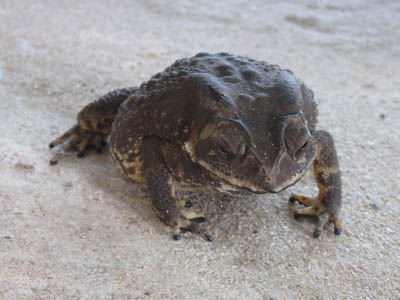
Asiatic Toad on Koh Chang
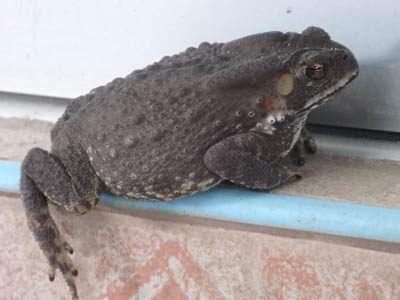
Image Copyright Jean-Pierre Odet
Last Observed: March 2016, Koh Chang
Observed By: Jean-Pierre Odet
This unassuming toad has an impressive number of pseudonyms including Asian common toad, Asian toad, black-spectacled toad, common Sunda toad and Javanese toad.
They occur in a range of habitats from Pakistan through to the Indonesian islands. They are common sights in areas of human habitation and are known to take advantage of the plentiful food provided by streetlights when flying termites swarm.
Asiatic Toad Wikipedia
Collared Kingfisher (Todiramphus chloris)
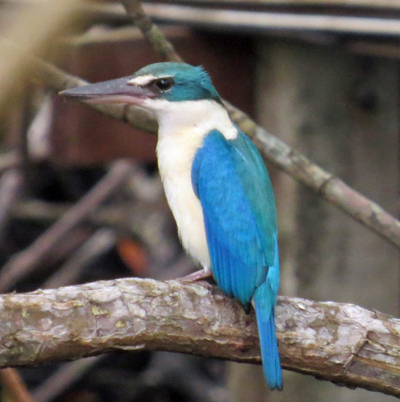
Collared Kingfisher Ian Macnamara
Last Observed: March 2016 – Koh Chang
Last Observed By: Ian Macnamara
The collared kingfisher is a medium sized kingfisher with a distinctive white body and vivid cyan head and wings.
It inhabits a wide area from the Red Sea through to Polynesia. On Koh Chang they are found in and around mangrove forested areas.
They have a loud and harsh call and feed on crabs, insects, worms, snails and that kind of stuff.
Collared Kingfisher Wikipedia
Finlayson’s Squirrel (Calliosciurus finlaysonii)
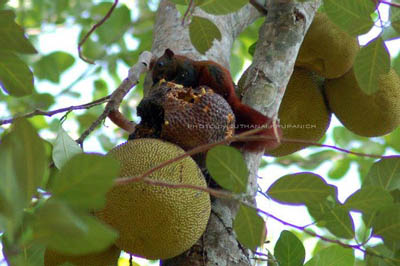
Image Copyright Suthanai Krupanitch
Observed: Koh Chang, March 2016
Observed By: Suthanai Krupanitch
Finlayson’s squirrel is a species of rodent that is found only in Thailand, Cambodia, Burma, Laos and Vietnam.
The squirrel has 16 subspecies that vary wildly in colour but are all part of the same species – as you can see the ones found on Koh Chang are a deep orangey black in colour.
They are arboreal (tree-dwelling) animals and feed primarily on fruit and nuts.
Finlayson’s Squirrel Wikipedia
Needlefish (Belonidae)
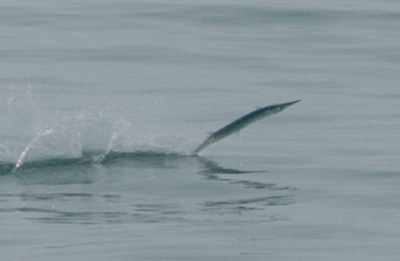
Image: David Vinot
Observed: Koh Chang, February 2016
Observed By: David Vinot
The Needlefish are a family of fish that feed on other small fishes and live at or near the sea surface.
They are notable for their ability to leap out of and skip along the surface of the water. This behavoir, whilst delightful to behold can pose a threat to humans since shoals of needlefish can leap over fishing boats and impale themselves in the unwary at speeds of up to 60km/h, causing nasty puncture wounds.
Needlefish Wikipedia
Thailand Black tarantula (Haplopelma Minax)
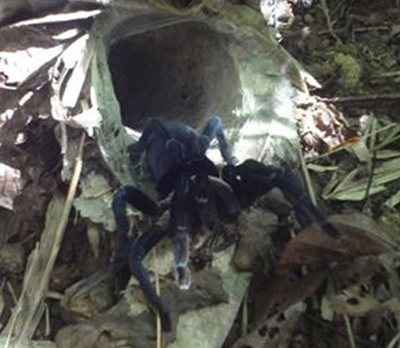
Image Copyright Robin Stenslund
Observed: December 2015, Koh Chang
Observed By: สุธนัย ครุพานิช
Arachnaphobes look away, click return, nothing to see here.
Everyone else celebrate the marvellous Thailand black tarantula. It is a species of old-world tarantula native to Thailand.
They are floor living jungle dwellers and reside in a burrow that is surrounded by special web filaments that, when triggered by prey, will bring the spider out to capture and feed.
There are actually several similar species of Haplopelma in Thailand/Burma/Cambodia/laso area and they are quite similar so this might be one of the sisters of Minax. The last recognised species Haplopelma Longipes was only identified in 2005, so you never know, this might be a new one.
Haplopelma Wikipedia
Transverse Ladybird (Coccinella transversalis)
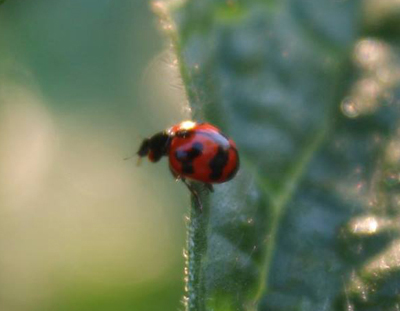
Image Copyright Perry Stevens
Last Observed: March 2016, Koh Chang
Observed By: Perry Stevens
This common species of ladybird is found from India across to Australasia.
From a human perspective this little beetle is one of the good guys since it preys on many plant eating insects such as aphids and leafhoppers that cause damage to commercial crops.
It has a black head and a red/orange body with sort of Rorschach blotches where (if you’re European) you’d expect to see spots.
Transverse Ladybird Wikipedia
Greater Coucal (Centropus sinensis)
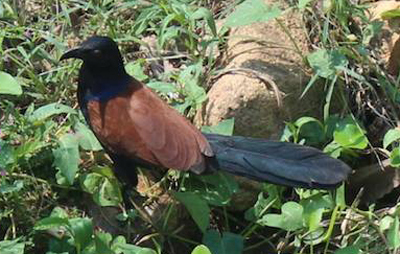
Image Copyright Perry Stevens
Last Observed: March 2016 – Koh Chang
Last Observed By: Perry Stevens
The greater coucal is also known, endearingly if rather confusingly, as the crow pheasant. In fact it is a memebr of the cuckoo order of birds. they look a bit like crows though, except for the brown “jacket” that they sport.
They can’t fly very well, poor things and instead scramble around on teh forest floor looking for insects and also the eggs and hatchlings of other birds.
They are a large bird that grows up to 48 cm in length. Their deep, resounding call is associated in many places with omens, spirits and general spooky stuff, but that’s not the bird’s fault.
Greater Coucal Wikipedia
Asian Giant Toad (Phrynoidis asper)
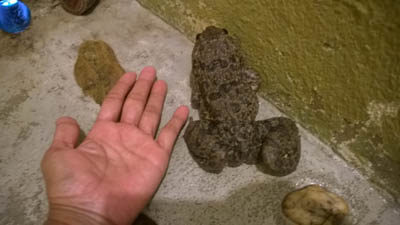
Image Copyright Napha Kotkangplu
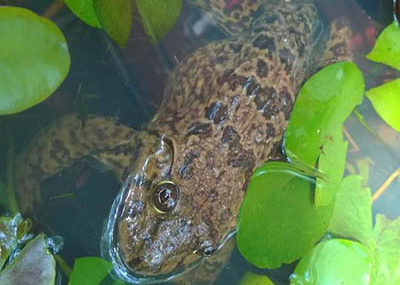
Image Copyright Napha Kotkangplu
Last Observed: March 2016, Koh Chang
Observed By: Napha Kotkangplu
As the name suggests the Asian Giant Toad is a giant of the amphibian world. This warty behemoth can grow to lengths of over 22cm.
They are common residents of fast streams and waterfalls around Koh Chang.
Asian Giant Toad Wikipedia
Nettle Caterpillar (Parasa lepida)
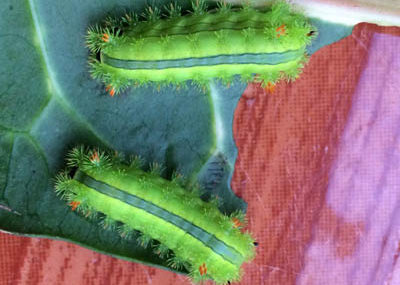 Last Observed: March 2016 – Koh Chang
Last Observed: March 2016 – Koh Chang
Last Observed By: Hans Henrik Hansen
The nettle caterpillar is a bright green caterpillar with a dark green stripe that eventually devlops into a brown and green moth.
It’s larvae are considered to be pests and pose a threat to various crops such as coffee, coconut, cocoa, tea nad mango.
Nettle Caterpillar Wikipedia
Red-Headed Trogon (Harpactes erythrocephalus)
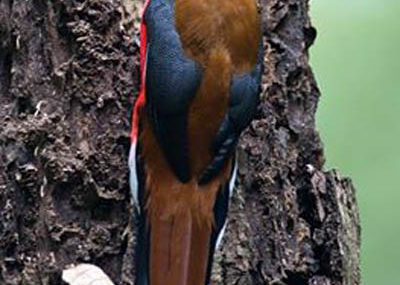
Image Copyright Suthanai Krupanitch
Last Observed: March 2016 – Koh Chang
Last Observed By: Suthanai Krupanitch
The red-headed trogon is a medium sized member of the Trogon family of birds that grows to 34cm length on average.It has a number of subspecies with variations in colouration but the are all of the same overall species of bird.
Typically the bird favours upland forests as a habitat so and it is rarely sighted below 300 metres. But Koh Chang has some lofty peaks it is clearly quite at home here.
They feed on insects that they peck from leaves and branches and also catch in mid-air.
Red-Headed Trogon Wikipedia







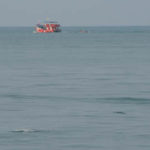
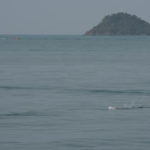
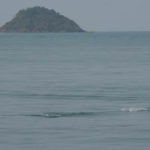
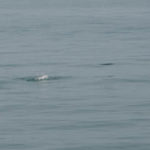
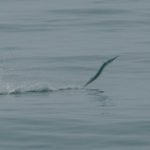
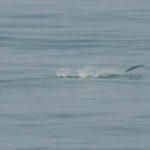





 Last Observed: March 2016 – Koh Chang
Last Observed: March 2016 – Koh Chang
